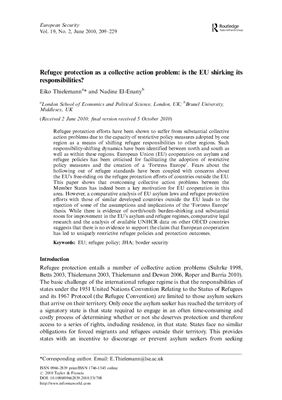London School of Economics and Political Science, London, UK;
Brunel University, Middlesex, UK
(Received 2 June 2010; final version received 5 October 2010)
Refugee protection efforts have been shown to suffer from substantial collective action problems due to the capacity of restrictive policy measures adopted by one region as a means of shifting refugee responsibilities to other regions. Such responsibility-shifting dynamics have been identified between north and south as well as within these regions. European Union (EU) cooperation on asylum and refugee policies has been criticised for facilitating the adoption of restrictive policy
measures and the creation of a ‘Fortress Europe’. Fears about the hollowing out of refugee standards have been coupled with conces about the EU’s free-riding on the refugee protection efforts of countries outside the EU.
Brunel University, Middlesex, UK
(Received 2 June 2010; final version received 5 October 2010)
Refugee protection efforts have been shown to suffer from substantial collective action problems due to the capacity of restrictive policy measures adopted by one region as a means of shifting refugee responsibilities to other regions. Such responsibility-shifting dynamics have been identified between north and south as well as within these regions. European Union (EU) cooperation on asylum and refugee policies has been criticised for facilitating the adoption of restrictive policy
measures and the creation of a ‘Fortress Europe’. Fears about the hollowing out of refugee standards have been coupled with conces about the EU’s free-riding on the refugee protection efforts of countries outside the EU.

